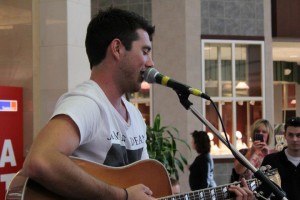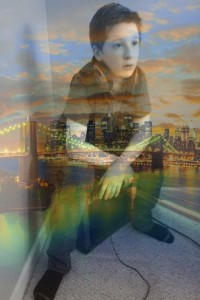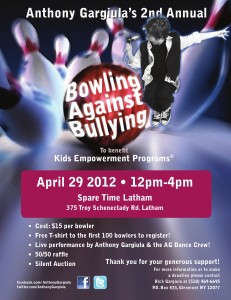Casey Stratton graduated from Interlochen Arts Academy in 1994. He moved to LA and released several albums both with a small indie press and with Rondor Publishing. After moving to New York City and becoming the subject of a bidding war between RCA and Sony Classical, Casey scored a major label deal and went back to LA to record “Standing At The Edge” with legendary producer Patrick Leonard (who has also worked with Madonna, Rihanna, and Paul McCartney among others). Casey left Sony shortly thereafter, but has continued releasing music on his own Sleeping Pill Music label. His latest release is The Vigil, available for download on his website.
ANTHONY: Hi, Casey! Thanks for “sitting down” for this little chat. Let’s start out talking about your new project. Tell us what the album is about and how it came to be, if you will.
CASEY: The latest record is called The Vigil. It is an orchestral production with all the songs arranged for vocal, piano, strings, oboe and percussion. It is technically a follow up to Messages Sending, which I wrote and recorded in 2009. It deals with terminal illness. My cat of 16 years, Henry, was diagnosed with chronic renal failure in April. I knew our days were numbered. We were extremely close. I was distraught and feeling very caught up in the whirlwind of hospice mode and anticipatory grief. Writing this work gave me an outlet for those feelings, how it feels to know you are going to lose someone you love. I tried to give a voice to everything from hope to despair to resignation. I truly hope it will help others.
A: THE VIGIL is an intensely personal work, as is so much of what you’ve released over the years. Have you ever written a set of music and then felt “no, this is too personal to release right now” and held it back?
C: I can’t think of anytime I have done that. I am fairly comfortable being exposed emotionally in my work. I have always loved intensely personal music. So when I started writing songs, even at 11 years old, I knew what my “calling” was. I will say I have had moments where I write a lyric and change it before I even get to the recording process because it is too personal, but once it’s recorded I generally release it even if it might make me feel a bit uncomfortable. There is a great sense of weight lifting to put my emotions into the music.
A: As your friend, I knew exactly who you were singing about on THE VIGIL, and yet I couldn’t help project my personal experiences onto the songs. Do you intentionally set out to make your music personal and universal at the same time, or do you write the personal and just hope other people can connect?
C: I absolutely make sure to keep things as universal as I can while writing. I have moments where lyrics are personal to my situation alone, but even with those you never know who might take it a different way. I do not release music with the intention for people to think about me, I want them to think about themselves. I feel that is the most important thing that music can do; help people process their own experiences. Or even just to remind them of someone, something.
A: Would you describe THE VIGIL as a classic “concept album,” with (for lack of a better term) a storyline for listeners to follow? In the past it seems like you’ve shied away from clear storylines even when your albums did have a defining concept to them.
C: I do think it’s a concept album, but there really isn’t a clearly defined linear narrative. The songs are not chronological to me. I chose to order them in the best way I felt they belonged musically. Still, of course, in the end there is death so it does wrap itself up. The narrative is almost like a ‘Choose your own adventure” book. You can make it whatever you need to. The thing about grief is that you jump around all the time, so I didn’t think a clear linear narrative was necessary. But it does certainly cover the bases of what the days and months are like when you are in the holding pattern of a terminal illness.
A: You’ve had your brush with major studio label production, but the majority of your career has been as an independent artist. Talk to me about the pros and cons of being a self-supporting independent artist.
C: Well of course the pros are that I have complete control over what I write, record and release. From the track sequencing to the artwork to the promotion, it is all up to me. I can be as artistic as I want to be. In the major label world, I was constantly being told to dumb it down. That “less is more.” To cater to the lowest common denominator. I didn’t care for that. I also just felt that there was far too much micro-managing when I was signed. It is not my cup of tea to have 14 people arguing for 6 weeks over whether or not I have to wear glasses in every photo and concert I ever do for the rest of time. That actually happened. Too much talk about clothes, weight, not being attractive enough, what I said in interviews, what I didn’t say in interviews. Too many cooks. Too many corporate bottom lines. I dreamed of it my whole life, but in the end it wasn’t for me.
A: With Youtube and such sites, younger singers and musicians are getting “discovered,” some going directly to major label contracts and some growing large fan bases with the goal of getting a major label contract. What advice can you give to those young singer-songwriters?
C: Be careful! Unfortunately the immediate access to millions in the internet age is a double-edged sword. It gives people chances they would never have had before. But it also over-saturates the market. There is just SO much out there, it’s hard to be noticed. Yet some people are, and many are not ready. I would tell them to keep the people they trust, REALLY trust, close to them. Don’t be fooled by big promises and empty compliments so much that you shut out the people who really care about you and don’t just see dollar signs. Sadly, you just never know who may be betraying you. It happens to all of us.
A: We know that touring is difficult in the current economic climate; most of the independent artists I know are playing close to home and no longer traveling cross-country to play small venues in big cities. Podcasts seem to help fill that hole in your ability to play live for your fans. Where can people find your podcasts, and how often do you put out a new one?
C: My podcasts are available at www.caseystratton.com under the Podcasts tab. You can even watch them live. I also record them so they are available for viewing after the fact as well. I do them on Thursdays at 6:30 Eastern US time. I do not do them every week, but when I do it is always at that time.
A: Is creating a new podcast still fun for you, or has it become another marketing tool?
C: I understand that I am doing them because it is necessary, but I also enjoy them or I wouldn’t do it. I like when people send me questions. And I love being able to do a little informal Q&A with the people who join live after the recorded portion ends. It’s very fun to talk to everyone. They use the chat window on UStream, and I answer on the video feed.
A: I can’t imagine talking to you about music without talking about your musical influences. In your bio online you mention that people think you sound like certain artists, as well. So, let’s play “word association:”
A: Tori Amos.
C: Dali
A: Sarah McLachlan.
C: O’Keefe
A: Peter Gabriel.
C: Rhythm
A: Loreena McKennitt.
C: Ethereal
A: Lady Gaga.
C: Image
A: Patrick Leonard.
C: Kindred spirit
A: Rosanne Cash.
C: Wit
A: Indigo Girls
C: Folk
A: Wilson Phillips
C: Beautiful friends
A: On a completely different topic: are you already on to writing your next project, or are you taking a little bit of a break?
C: I am taking a break from writing for a while. It is odd for me not to be way ahead of myself all the time, as I was for many, many years. I am enjoying the feeling of not knowing what is next. I am playing a show of all Tori Amos songs in August here in Michigan, so I am very busy with that. When that is over I will take some time off. When my cat Henry died, I was very much destroyed, but I have had a lot of work to do since then. I am looking forward to just taking a week or so to go inward with no obligations. I am lucky to be self-employed in that regard.
A: I’d really like to talk about your creative process. I know as a writer I hate the old standard “where do you get your ideas from,” so we’ll avoid that line. But I’m curious: lyrics before melody? vice-versa?
C: I write the music before the lyrics 99% of the time. Every once in a while one or two lines will pop into my head and I’ll write to them, but hardly ever. In fact, most of the time I produce an entire track before I write one word. I feel that, to me, the music tells its own story. So I listen to it and try to decide what it wants to be about lyrically.
A: How do you go about putting an album together, in terms of song sequence. The anthology editors I know talk about “strong anchor stories” for the lead-off and final spots. Do you think of it in that way, or is there a more organic process?
C: No I do think of it exactly that way. I like to know what is opening and closing a record early in the process if it happens that I write those songs early enough to do so. It sets a tone and gives me space to maneuver in and out of, knowing where it began and where it is all headed. I also tend to know which songs feel like they need to go in the first half and which in the second. This, of course, comes from the vinyl and cassette age of Side A and Side B, but I still do it. In the end, I have to narrow down which songs will actually make the final cut and then assemble them. I tend to be sequencing as I go, putting songs where I think they will end up and then, as the projects gets to be completed I can move them around if something feels off. It’s very organic and I rarely get stressed out about it.
A: Some projects of yours feel very scaled down, others have full orchestral arrangements. What makes the decision to fully orchestrate or not?
C: I do with my gut about almost everything. It has been the secret to my success as a writer, I think. I don’t get caught up questioning everything. Whatever comes, I take it. I have a very spiritual approach to writing. I take it very seriously and make sure I have all the tools I need (a large knowledge of music theory, especially) to compose, but I never worry too much about it. If it is there, I grab onto what is coming in. If not, I walk away and try again another day without judging myself or worrying. I think writers can create traps for themselves. Some are very good at working within a structure of time or daily goals or what have you. But for some, I have seen it create a situation where what they write disappoints them or they write nothing, and then they are upset with themselves and wouldn’t you know it here comes a month of writer’s block! I find this to be universal in all of the arts. I am very careful to just let it go if it’s not a great day and trust it will come around again. But in respect to production, the song kind of knows what it wants. Or I can just be in a certain mood. Sometimes I’ll say “I want the next project to sound like _____” Sometimes that works out, and other times I end up a million miles from wherever I thought I was going. You just never know until you begin. Instincts, for me, are key. And following them is part of the challenge…and the fun.
A: And now for my usual final question: What is your favorite book, and what would you say to recommend it to someone who hasn’t read it yet?
C: My favorite book is The Golden Notebook by Doris Lessing. Something about her work really resonates with me. Perhaps it is that she has just as much fervor for exploring our inner thoughts and feelings as I do. I don’t know. It is a hard book to describe, since there are stories within the stories. It is mostly a story told through a female writer, as she traverses life in 60s London. Through complex relationships with both lovers, children and friends, she weaves a tale of self-discovery that everyone can relate to in some way.
A: Thanks again, Casey!
You can find Casey on Facebook, his website, Twitter, Youtube, and just about every other social forum out there where music is discussed. Check him out, and tell him Anthony sent you!










